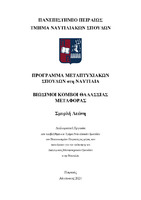| dc.contributor.advisor | Τσελεπίδης, Αναστάσιος | |
| dc.contributor.author | Σμυρλή, Λεώνη | |
| dc.date.accessioned | 2021-11-18T08:16:23Z | |
| dc.date.available | 2021-11-18T08:16:23Z | |
| dc.date.issued | 2021-08 | |
| dc.identifier.uri | https://dione.lib.unipi.gr/xmlui/handle/unipi/13841 | |
| dc.identifier.uri | http://dx.doi.org/10.26267/unipi_dione/1264 | |
| dc.description.abstract | Οι σύγχρονοι ρυθμοί τεχνολογικής ανάπτυξης καθώς και η άμεση ανάγκη πολιτικής και κοινωνικής κινητοποίησης σε θέματα που αφορούν το περιβάλλον ασκούν αυξανόμενη πίεση στα λιμάνια να στραφούν προς την βιώσιμη ανάπτυξη. Τα λιμάνια αποτελούν πλέον αναπόσπαστο μέρος των αστικών κέντρων στα οποία ανήκουν, καθώς αποτελούν διώρυγα επικοινωνίας και εμπορίου με τον υπόλοιπο κόσμο και έχουν σημαντικό ρόλο στην οικονομική και κοινωνική ζωή των πόλεων. Το ζήτημα της βιώσιμης ανάπτυξης έχει λάβει μεγαλύτερες διαστάσεις τα τελευταία χρόνια αυτό οφείλεται σημαντικά στο γεγονός ότι τόσο ο Οργανισμός Ηνωμένων Εθνών (Ο.Η.Ε) όσο και η Ευρωπαϊκή Ένωση (Ε.Ε) καθώς και οι εθνικές κυβερνήσεις, έχουν εκδώσει οδηγούς για να προωθήσουν την εφαρμογή της σε πληθώρα τομέων, συμπεριλαμβανομένων των λιμανιών και γενικότερα των μεταφορικών κόμβων. Έτσι λοιπόν το σύγχρονο λιμάνι έχει χρέος να ακολουθήσει τις οδηγίες και να συμμορφωθεί με τους νέους κανόνες που ορίζονται τόσο από τις διεθνείς αρχές αλλά και από το ρεύμα της εποχής. Κάθε θαλάσσιος μεταφορικός κόμβος καλείται να αναδιαμορφώσει και να αναβαθμίσει την εφοδιαστική αλυσίδα του, τις υποδομές του, τον τρόπο με τον οποίο εκμεταλλεύεται και χρησιμοποιεί τα νέα τεχνολογικά μέσα, καθώς και τις εσωτερικές λειτουργικές δομές του, για να είναι σε θέση να προσφέρει ποιοτικότερες υπηρεσίες, οι οποίες δεν επιβαρύνουν το περιβάλλον ούτε την κοινωνία που τον φιλοξενεί. Η ναυτιλία πλέον έχει στρέψει το ενδιαφέρον της στην διατήρηση των πόρων και στην μείωση των αποβλήτων καθώς οι πρωτοβουλίες του σήμερα είναι αυτές που θα διαμορφώσουν τις μεταφορές του αύριο. Η παρούσα εργασία έχει λοιπόν ως στόχο να αναλύσει την έννοια της βιωσιμότητας, το νομοθετικό πλαίσιο και τους πιθανούς τρόπους εφαρμογής της καθώς και να ερευνήσει πως διαφορετικά ενδιαφερόμενα μέρη στον χώρο της ναυτιλίας αντιλαμβάνονται τον όρο και πως θεωρούν ότι μπορεί να συνεισφέρει στην αναβάθμιση ενός εμπορικού λιμανιού. | el |
| dc.format.extent | 90 | el |
| dc.language.iso | el | el |
| dc.publisher | Πανεπιστήμιο Πειραιώς | el |
| dc.rights | Αναφορά Δημιουργού-Όχι Παράγωγα Έργα 3.0 Ελλάδα | * |
| dc.rights.uri | http://creativecommons.org/licenses/by-nd/3.0/gr/ | * |
| dc.title | Βιώσιμοι κόμβοι θαλάσσιας μεταφοράς | el |
| dc.type | Master Thesis | el |
| dc.contributor.department | Σχολή Ναυτιλίας και Βιομηχανίας. Τμήμα Ναυτιλιακών Σπουδών | el |
| dc.description.abstractEN | The modern pace of technological development as well as the urgent need for political and social mobilization on environmental issues are putting increasing pressure on ports to turn to sustainable development. Ports are now an integral part of the urban centers to which they belong, as they are a channel of communication and trade connecting them with the rest of the world and they play a crucial role in the economic and social life of cities. The issue of sustainable development has grown in recent years, largely due to the fact that both the United Nations (UN) and the European Union (EU) have issued guidelines to promote its implementation in a variety of sectors, including ports and transport hubs in general. So the modern ports have a duty to follow the instructions and to comply with the new rules set by both the international authorities and the current of the time. Each port is called upon to reshape and upgrade its logistics chain, its infrastructure, the way in which it exploits and uses new technological means, as well as its internal operational structures, in order to be able to offer better services, while it does not burden the environment or the society that hosts it. Shipping has now turned its attention to conserving resources and reducing waste as today's initiatives are what will shape tomorrow's transport. The present work therefore aims to analyze the concept of sustainability, the legal framework and possible ways of its implementation as well as to investigate how big terminals understand the term and how they are implementing it. | el |
| dc.contributor.master | Ναυτιλία | el |
| dc.subject.keyword | Λιμάνια | el |
| dc.subject.keyword | Βιωσιμότητα | el |
| dc.subject.keyword | Βιώσιμη ανάπτυξη | el |
| dc.subject.keyword | ΣΒΑ | el |
| dc.subject.keyword | Ναυτιλία | el |
| dc.subject.keyword | Περιβάλλον | el |
| dc.subject.keyword | Κοινωνία | el |
| dc.subject.keyword | Κόμβοι θαλάσσιων μεταφορών | el |
| dc.subject.keyword | Ανάπτυξη | el |
| dc.subject.keyword | Πράσινα λιμάνια | el |
| dc.date.defense | 2021-08-30 | |



